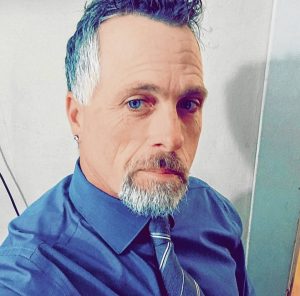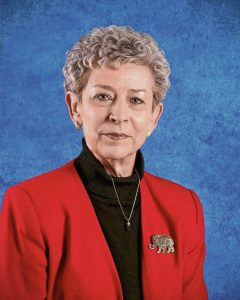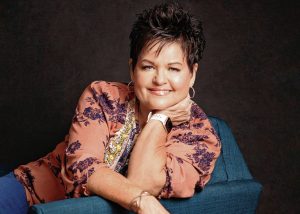For the three Republicans vying for Greenwood Common Council District 1, the same issue comes to mind about one of the top concerns facing the city: public safety.
Each candidate has a different idea on how to address it.
Incumbent Linda Gibson, who has held the seat since the death of her husband John in 2008, is asking voters to keep her in office. Challengers Hurley Davis, the 50-year-old owner of Hurley’s Outdoor Services, and Robin Klutzke, a 60-year-old retired radiology technician, believe it’s time for change for the seat that has been held by members of the Gibson family for a half-a-century.
Every seat of Greenwood’s legislative body is on the ballot, and challengers have filed to run against incumbents in District 1, 4 and 5, along with at-large. District 2 incumbent Ezra Hill, District 3 incumbent Michael Williams and District 6 incumbent David Leske are not challenged in the primary.
Democrat Manjit Nagra is challenging Williams in the general election for District 3, and Democrat Nathan Cardenas will face whoever is selected in the Republican primary for District 4. Libertarian James Sceniak is running for the at-large seat this fall.
ABOUT THE JOB
What: Greenwood City Council District 1
District 1: Represents everything southeast from the County Line Road interstate interchange to near Madison Avenue. Further south, it follows the Louisville & Indiana Railroad to Smith Valley Road, before going as far south as Laguna Lane.
Term: Four years
Pay: $13,058.98 a year (2023)
Duties: Set annual spending for the city, make policy changes, adopt new local rules and ordinances, approve new taxes, appoint members to various city boards.
To help voters make their decision in the District 1 city council race, the Daily Journal asked the candidates their takes on issues facing the city.
Here’s what they said, edited for length, clarity and grammar:
What made you want to run for this office?

Davis: I worked for the city of Greenwood (street department) for nearly 21 years, and I didn’t like a lot of things, how they were run and equipment being bought — stuff like that. They buy equipment through fleet maintenance and everything else, and some of the equipment they bought wasn’t feasible for our community. But they bought it anyway. … It’s just there’s a lot of things that need to be changed in the way things are bought, and more like what are our needs instead of wants.
Gibson: I really enjoy serving the public. I was an only child and I was raised that it’s important to help people and to lend a helping hand, and so it was a no brainer. My husband died in 2008 … He had a six-year battle with cancer. He had been elected to his eighth term and he died in the first year of his term. John and I never had any discussion about his seat on the city council. We were too busy fighting the cancer beast. So during his calling at the church, I had people that would whisper in my ear and say, ‘Linda, you need to get John’s council seat. He would want you to do that.’ … I really needed to find something that I could get engaged and be busy with, and what better thing than something that I was already familiar with.
Klutzke: I’ve been thinking about doing this for about 10 years, but I really felt like I needed to have my own crap together, for lack of a better word … to be able to serve the people in my community because if I can’t give everything that I have and to be there for them, it wasn’t going to work. … So a couple of years ago, I just had this epiphany and I just thought that I didn’t really like what was happening to our city. I don’t mind growth, growth is inevitable and growth is good. But as things started to get bigger and better, and I mean, so many factors played into the violence and the crime and stuff like that. But it has, as our population has increased, our crime, too, has increased.
What, to you, are the most pressing issues facing the city?
Davis: Growing too fast. … We’ve got too many projects going at one time. It’s hard to tell if any other projects will work when the one’s not even finished yet before they start another three or four. We have a lot of problems with infrastructure as far as roads, especially in our district, with sidewalks and roads that have gone away. Or the roads are laid over a cornfield; there’s nothing underneath them, so they need to under drainage and base so they need ripped out. So there are a lot of areas that we could spend money that’s more feasible than just making it look pretty and basically covering up the problems that the city actually has.

Gibson: I think some of our most pressing issues are our infrastructure, our public safety — that’s an intricate part of it. There’s so much turmoil over whether we have enough police or we have enough firemen. I asked for the statistics back from when I first came on the council. … When I came on the council in ‘09, we had 58 policemen and we had 30 firemen, and back at that point of time, we still had a lot of volunteer firemen. In 2023, we have 77 police officers and we have 68 firemen.
Klutzke: Public safety, absolutely. Finishing the projects that need finished, like our roads that are driven on daily are a freaking mess. … The reaching out to the people, listening to the people, hearing what they want is an obsolete thing now. I don’t feel like we, as people, citizens who put these people in office are being … informed. I am disgruntled with that part because I don’t feel like the current leadership is, I don’t think he’s listening, (that) they are listening to their constituents. … I’ve talked to so many people and they’re just like, ‘Now, if I wanted to live in Carmel, or I wanted to be somewhere like Carmel, I would move to Carmel or Zionsville or wherever.’ But Greenwood has always been an excellent community to raise your kids, and it just has and it’s just not that way (now). And honestly, I would love to get back that way.
What do you think the city council should do to address public safety?
Davis: It goes back to the budget, and worrying about paying these great officers to stay, doing more training programs — whether it be for the police (department) and fire (department) itself — the training programs to keeping everybody’s certifications up and paying them to stay, instead of, ‘Oh, well, it’s okay.’ Not everybody can be replaced. Just because your name’s on your uniform, doesn’t mean you can be replaced. … You got to make sure you can pay them, so if we go to the budget and figure out where we can trim the fat to be able to pay these guys to stay and to recruit new ones.
Gibson: I’ve talked to both chiefs independently, and (former chief) Darin (Hoggatt) before he retired, and they feel like that they’ve got what they need, so you have to listen to the chiefs. Back in 2008, they didn’t fund all of the police officers because they didn’t have the money to do it. They were budgeted for more, but they didn’t have the money for health care. I think it was two or three officers that we didn’t hire because we needed that money for health care. We don’t need the money for health care now, and if you look at our budget, our budget is the fourth lowest of any city or town within the state, and that’s including the smaller ones under 10,000 population. If you take those out, then we’re the lowest tax rate.

Klutzke: I’ve always been a big supporter of our police department because I respect them. … I would like to see the morale of our police department pumped up a little bit because I wouldn’t want to be a cop, and I don’t think they get treated adequately. I would be willing to pay more taxes to be able to beef up our police department or fire department, and not just pay them more, but make sure that they have adequate training to where they know how to handle their emotions and their quick instincts and stuff like that into just to keep the cool mind so that they don’t lose control. … I would definitely beef up our public safety. … Not that I would not want to raise taxes, but if I had to for public safety, I would. But I would sure look into that, and flip-flop some money because it’s quite possible.
How should Greenwood approach growth?
Davis: We should grow, but growing as fast as we are is not a good thing. I’m not sure, at this present time, that I can answer how to fix that until I see, from the inside, all the projects that are going on. … I don’t know what’s already on the books, (but) the job here is to attract employment and attract people that want to come to work in Greenwood. It needs to be steady employment, good employment. You want high-paying jobs here.
Gibson: The most important thing that we can do is have good growth and planned growth and things that are good for our community. Our quality of life is important; having a good park system, having a good fire and police department and having good schools are all important. We need to attract businesses that want to relocate their business or if they want to build a new regional division, and we’ve got to have the right infrastructure to do that. We’ve got to have a good police and fire department and schools, but the broader our tax base is, the lower our taxes will be. … We can be strategic about what properties come in and that we rezone and the type of commercial growth that we have. We’ve turned some businesses down that we didn’t feel like it was a good fit for our community, so it’s not like we’re going out there and, anybody that wants to come in, that we’re encouraging them to do that.
Klutzke: No, I don’t think they should continue this pace of growth. … I think they should stop (building for) now until they get the guts back together and working. … I would cease the apartment stuff and get (other) stuff taken care of. I mean, there are some things that you can’t stop, I understand that, and that kind of stuff will be taken into consideration, but we need to focus on finishing what we started. … I am for single-family homes just because I believe those are the people that are looking for a community to stay in. Maybe I’m wrong, but in my brain, if I’m gonna buy a house, I’m probably gonna stay there for a little bit. … I don’t want to say that I hate apartments, but I think we have plenty.
How do you feel about additional development of warehouses and logistics facilities?
Davis: It would be great if it was development that actually put back on a tax base. I don’t believe in giving tax abatements for everybody, and it suddenly seems like, ‘Oh, you want a warehouse built here? Oh, we’ll give you a tax abatement for 10 years.’ But then what happens in 10 years, when that company goes, ‘Okay, Franklin offered us a tax abatement. We’re gonna move to Franklin. We’re gonna take a whole facility and move to Franklin.’ So then you say no tax abatement, and then they go ahead and move to Franklin. So then you’re stuck on the hook for another 10 years because you’re more likely going to give them a tax abatement to keep them moving to Franklin to build another thing and leaving an empty warehouse. It’s a vicious circle.
Gibson: I think we’re about done with the warehousing/distribution. I’ve been favorable for the distribution centers because there’s a big tax base there, and that big tax base is helping our existing businesses and homeowners to have a lower tax rate. … We as a council, I know at least five of us don’t want warehouses or anything on Worthsville Road. We don’t want it there on the road. I know that there’s one that is not on the road, that they’ve got a strip in front of it, and I was lukewarm on that. I did vote for it, but I think at this point I think we’re pretty much done with warehouses. The distribution centers, those are different, but I don’t think there’s much property left in the area where we’ve been doing those.
Klutzke: I don’t want any more warehouses. I would be a really ticked off person if I lived and built a house over off Main Street, and they came and put a huge warehouse in my backyard. I think there needs to be boundaries there. … We don’t need any more stinking warehouses. We don’t need any more logistical outlets. We just don’t. I love people, but those are the jobs that bring in people (who) they’re not getting paid very well. We’re all humans. We all deserve a place to live, but I feel like if you want to change and keep a city with the small town feel … make the growth so that it doesn’t just go from Mayberry to freaking the east side of Indy. … I really thought that when County Line (Road) started exploding with the hospital, the professional buildings and stuff like that … I don’t know why we don’t try to bring that type of more of the medical facility, or manufacturing to bring in people with skills to work here.
How should tax abatements be used by the city?
Davis: I think it’d take me a while to decide on it. I would have to really look at it real hard, like ‘What’s the job growth? What’s the income?’ But I just believe we got a lot of things right now that need our help. Infrastructure and public safety should be No. 1 period. People aren’t gonna live in the community if they don’t feel safe. We don’t want to see any place run down.
Gibson: I think you have to look at the project and what it’s bringing into your city, both positive and negative, and then figure out if that’s the kind of neighbor that you would want. … They have to do the annual filing, and so when they apply for it, the abatement, they tell you how much they’re going to put in equipment. They tell you how much they’re going to put in their building and they tell you how many employees they’re going to bring in that 10-year period of time. So you want to see some growth going on in their employment. You have to be concerned about the salaries that they’re going to pay. … We’re not always doing 10-year abatements, sometimes we’re only doing five. But yes, I am in support of tax abatements but only if it meets the criteria that is right for our community.
Klutzke: Historically, Greenwood has done and given tax abatements and a couple (haven’t held up their end of the deal) … I don’t think they’re a bad idea if their intentions are to stay and be a part of our community. If it’s good for our community, and they’re a place that’s going to stay and maybe grow. … I don’t really think it’s a bad thing to offer (one) … as long as they’re going to add value to our community, and not just a job, but a good job — a job that can sustain a family and a company (that’s) a reputable place. But warehouses, they just don’t. I don’t think they bring in the right people because it’s a warehouse job. People sometimes make a career out of it, but not all the time. … If you work where you live, live where you work, you’re more than likely going to be invested in your community.
THE DAVIS FILE
Name: Hurley Davis
Age: 50
Family: Two children
Occupation: Self-employed, Hurley’s Outdoor Services LLC
Education: Greenwood Community High School
Political experience: First-time candidate
Memberships: Greenwood Little League, board member and coach
THE GIBSON FILE
Name: Linda S. Gibson
Age: 76
Family: Widowed, two adult children
Occupation: Retired from facility management
Education: Southport High School; Indiana University (some schooling)
Political experience: Incumbent since October 2008
Memberships: Greenwood First Baptist Church, The Social of Greenwood board; Aeronautical Center of Technology Academy board; Greenwood Village South board of directors and board of finance
THE KLUTZKE FILE
Name: Robin J. Klutzke
Age: 60
Family: Husband Dennis; three adult children
Occupation: Retired radiology technician
Education: Greenwood Community High School; Ivy Tech Community College
Political experience: First-time candidate
Memberships: Victory Christian Church; Volunteer for Johnson County Senior Services, Interchurch Food Pantry, Community Hospital South




